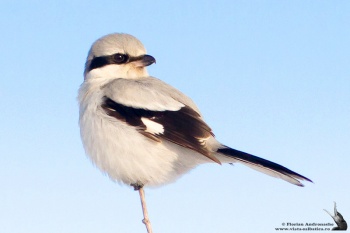- Lanius excubitor
Identification
Length 22-26 cm (8½-10¼ in), weight 50-80 g
Adult
- Grey head and back
- White belly, throat, flanks and chest (flanks often faintly barred pale grey in females)
- Black wings with white patch at base of primaries
- Medium-long tail, black with white outer feathers
- Black mask on face extending to base of bill, but not over top of bill
- Distinctive stout, hooked black bill
Juvenile
- Similar to adult except duller and faintly barred, with dark grey where adult black, and slight pinkish base to bill.
Similar species
In Europe, Southern Grey Shrike and Lesser Grey Shrike are potential confusion species, and in north-central Asia, could overlap with Northern Shrike.
Distribution
Northern Europe and northwestern Asia.
Taxonomy
Complex, and potentially liable to further revision[2]. Was formerly considered conspecific with Southern Grey Shrike, and some populations of this may need to be returned to Great Grey Shike. Populations from northeastern Asia and North America formerly included here have recently been split as Northern Shrike[2].
Subspecies

Photo by IanF
Coatham Wood, Longnewton, County Durham, UK, February 2012
This is a polytypic species currently treated as consisting of two subspecies[1]
- Small white patch at base of primaries; minimal white above black mask
- L. e. homeyeri: Balkan Peninsula to southern Ural Mountains and western Siberia
- Large white patch at base of primaries; broader white band above black mask; overall slightly paler than L. e. excubitor
The two subspecies intergrade where their ranges meet. A further subspecies L. e. leucopterus (western Siberia to the Yenisey River) was often accepted in the past, but is now included within L. e. homeyeri.
Habitat
Open upland forests and bogs with scattered trees. In winter, heathland, and sometimes farmland.
Behaviour
Diet
Diet includes large insects, small mammals and birds and it often stores uneaten prey by impaling it on thorns. They commonly hunt from a very high perch usually a tall tree top.
Vocalisation
Song
A complex and variable medley of short liquid trills, whistles, chatter and harsh notes.
<flashmp3>Lanius excubitor (song).mp3</flashmp3>
Listen in an external program
Call
A harsh shek-shek, grating jaaeg, rapid rasping aak...aak, a sharp metallic beek.
References
- Clements, J. F., T. S. Schulenberg, M. J. Iliff, D. Roberson, T. A. Fredericks, B. L. Sullivan, and C. L. Wood. 2017. The eBird/Clements checklist of birds of the world: v2017, with updates to August 2017. Downloaded from http://www.birds.cornell.edu/clementschecklist/download/
- Olsson, U. et al. (2009). The Lanius excubitor (Aves, Passeriformes) conundrum — Taxonomic dilemma when molecular and non-molecular data tell different stories. Molecular Phylogenetics and Evolution 55: 347–357.
Recommended Citation
- BirdForum Opus contributors. (2024) Great Grey Shrike. In: BirdForum, the forum for wild birds and birding. Retrieved 6 May 2024 from https://www.birdforum.net/opus/Great_Grey_Shrike
External Links
This link searches for videos of Great Grey Shrike





